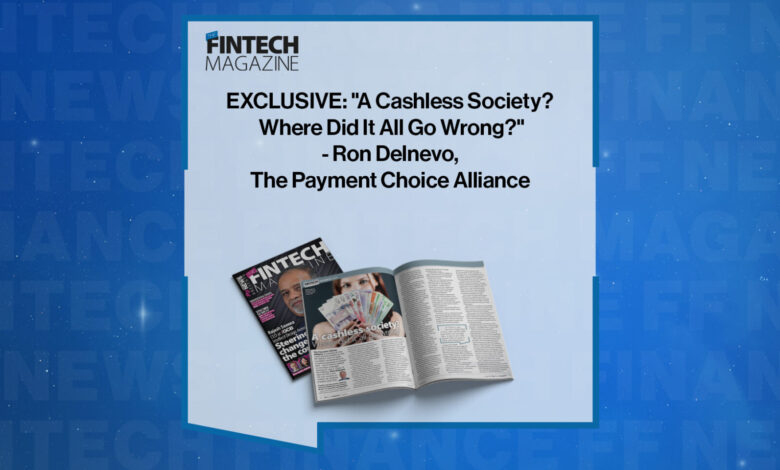EXCLUSIVE: “A Cashless Society? Where Did It All Go Wrong?”

The Payment Choice Alliance is pushing all the major political parties in the UK election race to make manifesto commitments to compel businesses to accept cash – since there’s clearly no shortage of people wanting to use it. Chair of the Alliance, Ron Delnevo, says the UK is not the only country to rethink the wisdom of going cash-free
Sweden was the poster child for cash-free lobbyists everywhere. By 2017, it seemed unstoppable.
Cash access had been slashed, with ATM locations substantially reduced, most remaining bank branches refusing to handle cash over the counter, and many businesses declining to accept cash. In fact, a ‘cashless’ Sweden became such a certainty that the prestigious Wharton Business School saw it sensible to publish an article in 2018 in which 24 March 2023 was identified as the day it would happen.
But in 2023, cash use in Sweden actually increased over 2022 levels! So, where did it all go wrong for the cashless collaborators?
Well, firstly, the pro-cash movement in Sweden stubbornly refused to accept the seemingly inevitable. They campaigned with great energy and found that their message wasn’t falling on entirely deaf ears. And then they got a bit of help from an unexpected quarter: Vladimir Putin.
Long before the invasion of Ukraine, the Russia leader’s posturing and a spate of suspected Russia-backed cyberattacks around the world had understandably made many people in Sweden nervous – including the government. Its concerns became so acute that in 2019 Swedish citizens were advised to keep a week’s supply of cash ‘under the bed’ as insurance against man-made or natural disasters rendering digital payments inoperable.
(I leave you to decide if Mr Putin is a man-made or natural disaster.)
However, the Swedish government realised that there was no point advising citizens to keep cash at home if banks were refusing to supply it. So it took steps to make the Swedish banks change their ways and on January 1, 2021, an amendment was introduced to the Swedish Act on Payment Services, requiring banks to provide access to cash services. ‘Cashless’ bank branches were outlawed, with banks compelled to offer over-the-counter cash withdrawal and deposit facilities for customers.
And all this was before Russia actually invaded Ukraine.
The rumour now is that as and when the Eurozone brings in a law mandating businesses to accept cash, Sweden will follow suit. The poster child for cashless is clearly never going to get the opportunity to reach maturity. Meantime, in the UK, perhaps sensing that Sweden was about to go very wrong for them, the cashless collaborators stepped up their efforts to impose their will on the British public.
It was a great drawback, of course, that cash remained rather popular in the UK. Indeed, the number of free-to-use ATMs – ATMs deliver 95 per cent of the cash used by the public in their daily lives – peaked at more than 54,500 in 2017. Cash was becoming conveniently available everywhere. What’s not to like about that, for the man and woman in the street?
Mysteriously, however, even though the public were very happy, at the end of 2017, the UK ATM Network LINK announced that it had decided there were too many ATMs in the UK. Its way of addressing this ‘excess’ was quite brutal. It told ATM operators that the already tiny payments – the lowest in Europe – they received for cash withdrawals were to be further reduced by up to 20 per cent.
Since LINK announced the reductions in payments for ATM cash withdrawals, the number of free-to-use ATMs has fallen from that 2017 peak of above 54,500 to less than 37,000 today – a fall of more than 32 per cent, or roughly one third. Meantime, more blows were being rained down on access to cash withdrawal and deposit facilities. On average, two British bank branches closed each day between 2015 and the end of 2021 – and the Big Five banks closure programmes have continued unrelentingly since then.
“UK Finance was forced to report that in 2022 cash use for retail payments had actually risen. A seven per cent growth year-on-year is really very impressive”
And then the ‘cashless’ collaborators also got a bit of help from an unexpected quarter: Covid.
Suddenly, in 2020, the British public were basically told they were not allowed to leave their homes. Between 2019 and 2021, the value of online sales in the UK went up from £75billion to £120billion, an increase of 60 per cent. Almost none of those additional sales featured cash. On top of that, when the public did actually make it to bricks and mortar retailers, they often found their cash was refused. Health concerns about handling cash was the main, though unsubstantiated, excuse.
So, taking all the negatives stacked up against cash since 2017, have the British public given up on cash as a payment method? Not a bit of it.
Today, the much-depleted LINK ATM estate continues to dispense 70 per cent of the value of cash dispensed pre-pandemic – and post offices, where cash services are available over the counter, have seen a substantial increase in the value of both cash withdrawals and deposits. All this cash activity meant that UK Finance – the trade association of the British banks – was forced to report that in 2022 cash use for retail payments had actually risen.
A seven per cent growth in transaction numbers year-on-year is really very impressive. And then the roof started to fall in on those seeking to impose cashless on the British public. Around the country, organisations large and small that had gone cashless were making the headlines when they started to recognise that their customers were very unhappy and that cashless needed to be binned.
There are many examples.
Perhaps the first great piece of news for cash was Greggs the bakers making clear after Covid that all its 2,400 stores across the UK were definitely accepting cash again. Greggs, of course, had the wisdom of its commitment to cash underlined when, in March 2024, an IT glitch”meant that cash was the only payment method it could accept in its thousands of stores! In March 2023, a kids’ uniform outlet in Worcestershire, The School Shop, reversed its cashless policy – had customers given it a hundred lines: “You Must Not Tell Us How We Can Pay”? Greene King, the pub company, in October 2023 took the decision that all its pubs would accept cash again.
In November 2023, the Royal Albion Hotel in Broadstairs, where the famous Chariots of Fire athletes trained for the 1936 Berlin Olympics, abandoned the race to cashless. In March 2024, York City Council reversed its decision to make its car parks cashless, having been faced with relentless opposition from local residents.
Also in March 2024, a major veterinary group, based in Herne Bay in Kent, admitted it had been barking up the wrong tree and started accepting cash again. Not far away, The Glass House pub in Ashford, Kent, made the same move. Customers telling the publican that they would never drink there again, meant it didn’t take long for the cash tills to start ringing again. Daventry Town Football Club found that cashless was an own goal, so kicked it into touch in April this year and welcomed its supporters’ hard-earned cash again. Most recently, the Imperial War Museum in Manchester, renounced its cashless policy.
Faced with criticism from so many in the city, including the Manchester Civic Society, it was inevitable it would concede this particular battle. Not all businesses are listening to their customers, of course, which is why we need legislation compelling them to accept cash. ASDA for one seems to be deaf to customer threats to boycott its card-only petrol forecourts. It’s a curious stance to take when Sainsbury’s and Tesco steadfastly keep the flag for cash flying at their pumps.
What all these examples illustrate is that the public will not be told how they can and can’t pay. So, the Payment Choice Alliance is pushing all the major political parties to make manifesto commitments in the upcoming election to pass legislation to compel businesses to accept cash.
This reflects the response of the British public to a YouGov survey in 2023, which revealed that 71 per cent of adults want a law put in place, guaranteeing they can use their cash, when and where they choose. Many neighbouring countries already have such legal measures in place, including the Irish Republic.
But businesses really shouldn’t need to be forced to do the right thing by law. All British businesses that say they truly care about their customers should be accepting cash now.
This article was published in The Fintech Magazine Issue 32, Page 14-15



